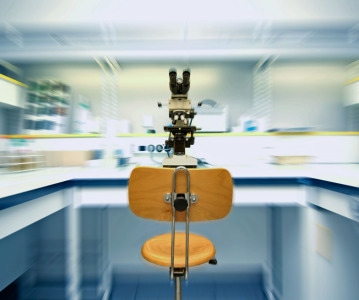FiH trial of new immunotherapy approach shows efficacy in antibiotic resistance
.png)
Human polyclonal antibodies show promise as effective treatment.
SAB Biotherapeutics has announced that its first-in-human trial of new immunotherapy approach has shown efficacy in antibiotic-resistant bacteria based on a recent paper published online in Clinical Infectious Diseases.
“This study provides the first clinical evidence showing the human polyclonal antibody therapeutic - produced from our natural DiversitAb immunotherapy platform - is safe, and provides an option for recalcitrant infection resistant bacteria where antibiotics and multiple other therapies were ineffective,” said Eddie J. Sullivan, SAB Biotherapeutics president and CEO.
“This is an important step in furthering the development of this platform technology in infectious disease, including antimicrobial resistance,” he continued.
The patientThe trial, conducted at Brigham and Women's Hospital, involved a patient who suffered from a chronic infection caused by antibiotic-resistant bacteria. Mycoplasma hominis can be an infectious pathogen in immunosuppressed individuals. The patient was diagnosed with M. hominis septic polyarthritis in 2009 and was treated with multiple courses of antibiotics with no improvement. A target-specific human polyclonal antibody was pursued as a potentially more effective therapeutics strategy.
The scienceSAB’s new immunotherapy approach – The DiversitAb platform – leverages transchromosomal (Tc) bovine that have been genetically designed to produce fully human polyclonal antibodies (IgG) in response to a bacteria, virus or toxin. To create the targeted treatment, SAB vaccinated a Tc bovine with inactivated isolates of the patient’s bacteria (M. hominis). After 10 days the antibodies began circulating in the bovine blood stream and were harvested in plasma over several weeks.
The treatmentThe plasma was purified in the company’s cGMP manufacturing facilities to isolate the antibodies – designated SAB-136. The patient – the first to be treated with human polyclonal IgG harvested from Tc bovine – received infusions to combat the infection.
The resultAfter one year, the high-dose therapy resulted in reduced M. hominis burden and improved clinical parameters. The infusions were well tolerated and with no significant adverse events. Safety was assessed with laboratory values, physical exam and subjective reports. Therapeutic efficacy was evaluated with samples collected from the primary infection site, and laboratory studies to monitor inflammation as well as a patient journal.
“This research demonstrates the potential for expanding treatment for immune deficient patients suffering from infections, which may have low coverage in current antibody replacement therapies,” said Duane Wesemann, a physician in the Rheumatology, Immunology and Allergy department at BWH and an Assistant Professor of Medicine, Harvard Medical School and principal investigator on the study.
“The use of DiversitAb platform begins to explore the relevancy for other patient populations in the setting of chronic, multi-drug resistant infections or viral infections for which there is no effective treatment or prevention strategy,” he added.
SAB’s first two immunotherapies targeting seasonal influenza and MERS-CoV are in clinical trials, with other infectious disease, oncology and autoimmune targets in development.
“With the advancements of modern medicine–and even recent immunotherapies–there are still many human health conditions without solutions,” concluded Sullivan. “Our hope is that our platform can provide a new rapid response and effective treatment for many of these patients.”
Related News
-
News CPHI Podcast Series: The power of proteins in antibody drug development
In the latest episode of the CPHI Podcast Series, Lucy Chard is joined by Thomas Cornell from Abzena to discuss protein engineering for drug design and development. -
News Amgen sues Samsung biologics unit over biosimilar for bone disease
Samsung Bioepis, the biologics unit of Samsung, has been issued a lawsuit brought forth by Amgen over proposed biosimilars of Amgen’s bone drugs Prolia and Xgeva. -
News CPHI Podcast Series: Why we need to consider women in clinical trials
The latest episode of the CPHI Podcast Series with Lucy Chard covers women's health, specifically women's representation in clinical trials, the associated bias, and the impacts on health for this population. -
News US FDA does not approve MDMA therapy for PTSD, requests more data
The MDMA-based therapeutic developed by Lykos Therapeutics, a California-based Public Benefit Corporation (PBC), has been reviewed and unapproved by the US FDA. The regulator has requested additional phase III trial data for further safety and efficacy... -
News Novartis and Viatris latest facing lawsuit over HeLa cell misuse
Global pharmaceutical companies Novartis and Viatris are the latest hit with a lawsuit claim pertaining to alleged misuse of the ‘HeLa’ cell line from the estate of woman whose cancerous tissue cells were taken without consent. -
News Sanofi invests billions into Frankfurt insulin production site
French pharmaceutical company Sanofi have announced an investment of EUR1.3 billion at their existing BioCampus site in Frankfurt am Main for the expansion of insulin production. -
News Novel oral Type 1 diabetes drug gains US FDA IND designation
A University of Alabama at Birmingham startup has gained FDA clearance for Investigational New Drug clinical trials for an oral Type 1 diabetes drug, a milestone for diabetes treatment. -
News A Day in the Life of a Vice President in R&D & Engineering
In the Day in the Life of Series, we've already had the chance to get to know a range of people in various roles in the pharma industry. In the latest interview we get a glimpse into the R&D side of things from Jennifer Sorrells, Vice Presiden...
Position your company at the heart of the global Pharma industry with a CPHI Online membership
-
Your products and solutions visible to thousands of visitors within the largest Pharma marketplace
-
Generate high-quality, engaged leads for your business, all year round
-
Promote your business as the industry’s thought-leader by hosting your reports, brochures and videos within your profile
-
Your company’s profile boosted at all participating CPHI events
-
An easy-to-use platform with a detailed dashboard showing your leads and performance

.png)

.png)
.png)
.png)
.png)
